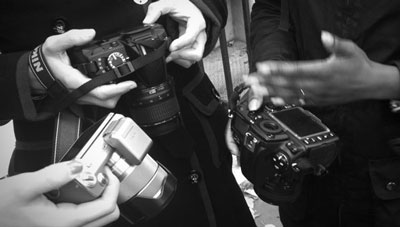By ANONYMOUS
The choice of a camera or even a camera system is a very personal decision. Functions, ergonomics and choice of glass are only some of the aspects that have to be considered. It’s safe to say that any camera today offers reasonable output. So does size still matter? Do today’s smaller sensor cameras match the IQ of their larger counterparts? I asked a camera aficionado who worked with the major recent releases that made waves, specifically the Nikon D800, Fujifilm X-Pro1, Olympus OM-D E-M5 and Sony RX1. He ownes them all, sold one, is tempted by the Leica M, but for him there’s only one true winner — or maybe two. Which ones?
- Fujifilm X-Pro1: I loved the IQ and colors, but need to do a certain style of shooting to make the best of it, i.e. not little kids or anything that needs fast AF. So I got rid of mine.
- Olympus OM-D E-M5: I wish I loved it as it’s small and convenient — but every time I shoot it and look at the out-of-camera files they look like they were shot with an iPhone when you are used to, say, Nikon D800 files. So for my taste I needed a lot of post-processing to get the most out of the files which is not my thing. The Oly sits in my camera cabinet gathering dust.
- Sony RX1: I love the IQ and the size — files looks great until I shoot the same subject/event with the D800. Detail is almost comparable but colors are not. I’m sure the deficit can be made up in post-processing if you are that way inclined. Amazing IQ for such a small package — enjoy it but the photographer needs to be able to control certain parameters more in order to get the best out of it.
- Nikon D800: Just blows my mind every time I use it — particularly with the 24/1.4, 35/1.4 and 85/1.4 I didn’t know I needed until you Dan convinced me otherwise. Makes even the dullest everyday scenes extraordinary. The user needs to improve their technique to get the best out of it — but the rewards are worth the effort!
- Leica M: Since years I’m tempted by Leica. Today? Maybe. A downtrade in sensor quality compared to the D800 (or even the RX1) just depends on how much you’re after the Leica look from those lenses. AF is important to me so the M system seems a big $ pay up for less camera — particularly when you gotta start a whole system from scratch. Of all the Leica Ms the 240 goes closest to getting me to open my wallet, but it’s still a lot of compromises in my opinion for marginal (if any) uptick in IQ compared to the D800 system.

Conclusion:
Every camera is a trade-off like everything, but the IQ of the D800 is definitely worth the weight burden for subjects that matter the most.
Leica M? When I want a small camera, the RX1 is smaller and has a better sensor. When I want more features, the D800 system offers me much more and comparable/better IQ. So I am finding two cameras is the best option for me. I haven’t run the numbers, but am guessing it works out cheaper as well. And the second camera gives me the option to hand the RX1 off to my wife so we can both shoot the same subject which is nice.


